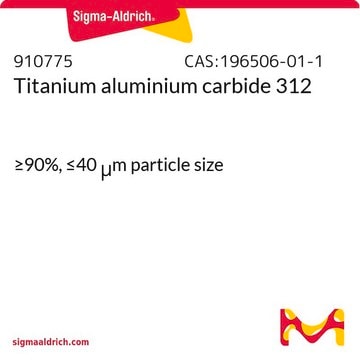357251
Tantalum
foil, thickness 0.5 mm, ≥99.9% trace metals basis
Synonym(s):
Ta
About This Item
Recommended Products
vapor pressure
<0.01 mmHg ( 537.2 °C)
Quality Level
Assay
≥99.9% trace metals basis
form
foil
autoignition temp.
572 °F
resistivity
13.5 μΩ-cm, 20°C
thickness
0.5 mm
bp
5425 °C (lit.)
mp
2996 °C (lit.)
density
16.69 g/cm3 (lit.)
SMILES string
[Ta]
InChI
1S/Ta
InChI key
GUVRBAGPIYLISA-UHFFFAOYSA-N
Quantity
Storage Class Code
13 - Non Combustible Solids
WGK
nwg
Flash Point(F)
Not applicable
Flash Point(C)
Not applicable
Personal Protective Equipment
Choose from one of the most recent versions:
Already Own This Product?
Find documentation for the products that you have recently purchased in the Document Library.
Articles
Biomedical implants are essentially foreign substances within the human body that must survive many years’ exposure to demanding mechanical and physiological conditions. Despite these challenges, metal implants have been widely used to substitute for or rebuild hard tissues such as bones and teeth.
Our team of scientists has experience in all areas of research including Life Science, Material Science, Chemical Synthesis, Chromatography, Analytical and many others.
Contact Technical Service



